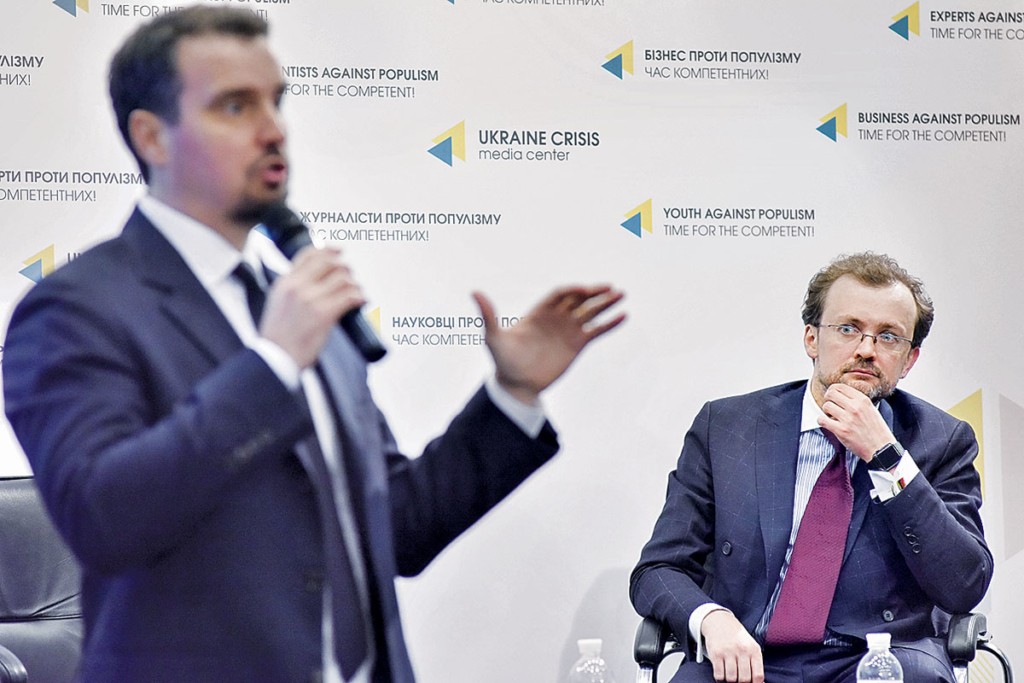Andriy Boytsun, now 41, graduated from his Kyiv high school in 1992, just a year after Ukraine gained its independence.
After going to university in Kyiv, he left Ukraine in 1999 to do his PhD in Belgium, and later taught as a visiting professor there. Now, 26 years after independence, Boytsun is back in Ukraine, advising its government on privatization and corporate governance of state-owned companies.
“Our world is different from what it was,” Boytsun says. “To leave does not mean to leave forever. People, and the world itself, have become free.”
Millions of Ukrainians have moved abroad to study, get a job, or marry. Boytsun is one of those who came back. Some return because of family, some because they didn’t find what they were looking for in other countries, and some because they missed Ukraine. There are also people like Boytsun, who come back to help.
Reforming Ukraine
“I realize that I’m doing important things for Ukraine,” Boytsun told the Kyiv Post. “A chance to take part in changing your country doesn’t come up often.”
In 1999 Boytsun went to study at the University of Antwerp, one of Belgium’s biggest universities. After earning a PhD in corporate governance, he took a post-doctoral research job and a visiting professorship there. Travelling regularly to Ukraine, he was in the country in late 2013 — just in time to witness the beginning of the EuroMaidan Revolution, which eventually swept the corrupt former Ukrainian President Viktor Yanukovych from power.
Over the next few months, he followed the events in Ukraine closely, writing explanatory opinion pieces for major Belgium media.
After the revolution, in the spring of 2014, the new management of Naftogaz invited Boytsun to draw up a concept of corporate governance reform for Ukraine’s state-owned gas and oil giant, which he did from Antwerp. When the plan came to the implementation phase in 2015, Boytsun realized he couldn’t keep working on it remotely.
“It was a case of (having to have) a constant presence,” he says.
When his job for Naftogaz was finished, Boytsun worked for another year as a research director at a Kyiv-based think tank, the Centre for Economic Strategy. Then last year Boytsun joined the Strategic Advisory Group for Supporting Ukrainian Reforms, working for Ukraine’s Cabinet of Ministers and co-chaired by former Deputy Prime Minister of Slovakia Ivan Mikloš and former Deputy Prime Minister of Poland Leszek Balcerowicz.
Boytsun now oversees the corporate governance reform of state-owned enterprises and privatization.
“I came because I thought it was very important,” Boytsun says, adding that he started helping Ukraine’s government pro bono. Nevertheless, he says he doesn’t judge those who move abroad and stay there.
“You can’t demand patriotism from people. You can respect it, but you can’t demand it.”

Andriy Boytsun (R) watches former Economy and Trade Minister Aivaras Abromavicius talking in Ukraine’s Crisis Media Center in Kyiv on April 21. (uacrisis.org)
Desire to return
Dima Eidelshtein from Dnipro, now 27, also went abroad to study, but he says he knew right away that he would come back as soon as he earned his master’s degree.
While studying architecture at the Prydniprovska State Academy of Civil Engineering and Architecture in Dnipro, Eidelshtein made a couple of brief visits to France on student exchange programs.
“I saw that their architecture is different, and they educate differently,” he says. “I thought that what we had been learning (in Ukraine) was not very up to date.”
So he received his master’s degree in Dnipro and entered another architecture masters’ program in Lyon, in south-eastern France, in 2013.
The EuroMaidan Revolution started soon after he left. As he followed the historic events in Ukraine, his desire to return grew stronger.
“I knew there was a place I was needed, with my knowledge,” he says.
Now Eidelshtein works as an architect at a private firm in Dnipro, designing parks, public gardens and other urban spaces.
“If you want to change, move abroad,” he says. “If you want to change the world around you, stay.”
Fulfilling potential
The story of Michael Sokha from Kyiv, 32, is quite different to those of Boytsun and Eidelshtein, but like them he is happy that he decided to return to Ukraine.
Sokha left Ukraine in 2014, driven out after the failure of his printing business. He sold everything and left for good — or that was what he thought.
“I chose Vietnam, a country where I had no one and which I knew nothing about,” he says. “I decided I would figure it all out when I got there. And I did.”
Sokha bought a motorcycle and travelled through Asia for nine months, journeying between Laos, Cambodia, and Thailand. When his savings ran out, he returned to Vietnam and stayed with a local family that owned a restaurant and a motorcycle business. He taught the family’s kids Russian, helped the restaurant with creating advertisements, and provided tourists with motorcycle excursions.
When demand for his services dropped in early 2015, he moved to Cambodia and, together with a friend, opened a pancake cafe for locals. At the same time, he worked on projects in design and typography, and did some local market research for Ukrainians who were involved in the gambling business.
Sokha says he was happy and was making enough money. However, he failed to persuade his girlfriend, who lived in the United States at that time, to join him in Asia, so they looked for a country to which they could move together.
“We decided to go to Ukraine and start there from scratch,” Sokha says. “Ukraine has quite a comfortable climate for launching a new business. The prices here are low. It’s our native country, and it’s easy to communicate with people.”
Together they opened a private school for children in Kyiv in mid-2015, and later expanded it to include summer camps in Ukraine, Bulgaria and Slovakia.
“I’m happy I’m back,” Sokha says. “Here, I’ve managed to really fulfill my potential.”
